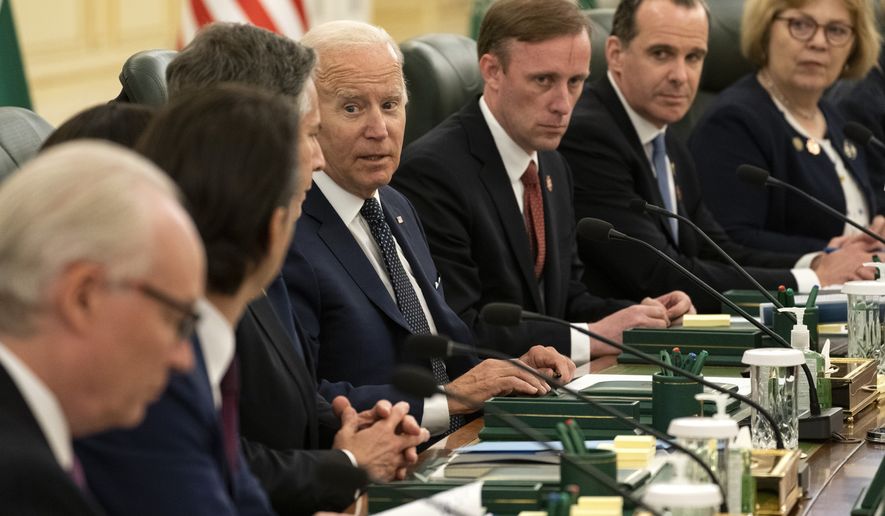President Biden will leave Saudi Arabia without a deal to increase oil supply, despite a hard push to get the oil-rich country to pump more crude amid record high gas prices.
Speaking to reporters Friday after his meeting with Saudi King Salman and his son Crown Prince Mohammed bin Salman, who is the nation’s de facto ruler, Mr. Biden admitted that little progress had been made to strike an oil deal.
“I’m doing all I can to increase the supply for the United States of America, which I expect to happen,” Mr. Biden said Friday. “The Saudis share that urgency and based on our discussions today, I expect we’ll see further steps in the coming weeks.”
A White House fact sheet released hours after Mr. Biden’s speech said the United States welcomes an increase in production levels 50% above what was planned for August and July. But that refers to an announcement made last month by the OPEC+ cartel, of which Saudi Arabia is a member.
It was a stunning concession from Mr. Biden, who handed Saudi Arabia a diplomatic win with the meeting without getting his main goal for the trip in return.
Mr. Biden said he raised the murder of journalist Jamal Khashoggi at the beginning of his meeting with Crown Prince Mohammad, who U.S. intelligence officials say orchestrated his death.
SEE ALSO: Biden, Saudi crown prince greet each other with a fist bump
“I said, very straightforwardly, for an American president to be silent on an issue of human rights is inconsistent with who we are and who I am,” Mr. Biden said. “I’ll always stand up for our values.”
The president also said that the crown prince denied any personal responsibility for the death of Khashoggi, a Washington Post columnist who was an outspoken critic of the Saudi government. Crown Prince Mohammad said he took action against those responsible for Khashoggi’s death.
Khashoggi’s murder has largely overshadowed Mr. Biden’s trip to Saudi Arabia, where the president sought to convince the kingdom’s leaders to pump more oil, finalize a delicate cease-fire with Yemen, and integrate Israel into the region.
Critics fiercely condemned Mr. Biden’s meeting with the crown prince, accusing the president of sacrificing his commitment to human rights in an effort to lower gas prices in an election year. Mr. Biden was frequently reminded that he once vowed to make Saudi Arabia a pariah for its role in Khashoggi’s death.
Mr. Biden greeted Crown Prince Mohammad with a first bump instead of a handshake to avoid giving the leader a photo opportunity that could lend more legitimacy to his rule amid alleged human rights abuses in the kingdom.
“The fist bump between President Biden and Mohammed bin Salman was worse than a handshake — it was shameful,” said a statement from Fred Ryan, the Post’s publisher.
SEE ALSO: Biden to push Saudi Arabia for more oil, but Russia could reap the rewards
Khashoggi’s widow also criticized the meeting, saying the blood of Crown Prince Mohammad’s next victim is on Mr. Biden’s hands for paying respect to him.
A defiant Mr. Biden pushed back, insisting his trip has larger implications for the U.S. and the world, and that it was about more than just the crown prince.
“I didn’t come here to meet the crown prince, I came here to meet with the GCC nine nations to deal with security and the needs of the free world and particularly the United States and not leave a vacuum here, which was happening as it has in other parts of the world,” he said.
But Mr. Biden walked away empty-handed on his key goal of spurring Saudi Arabia to ramp up oil production. Record-high gas prices have been a drag on the economy and have contributed to Mr. Biden’s approval ratings plummeting.
White House officials ahead of the meeting downplayed any expectations for a quick deal, saying the impact of Friday’s meeting won’t be known for weeks or months. They said the Saudi meeting was part of “further steps” that will eventually help stabilize prices.
It is unclear whether Saudi Arabia can increase production quickly enough to curb rising gas prices, despite holding the world’s largest oil reserves.
OPEC+ last month announced that members of the oil cartel agreed to a larger-than-expected hike in production. The cartel agreed to produce 648,000 barrels a day in July and August, rather than the 400,000 barrels a day that members initially planned to produce.
But they have also failed to meet that quota this month, raising questions about whether OPEC+ has the oil capacity to meet demand.
Mr. Biden did highlight some smaller concessions he achieved from Saudi rulers, despite turning up empty on the oil deal.
He did prompt Saudi Arabia to lift its airspace restrictions, allowing Israeli planes to fly above the kingdom for the first time in many years.
“This is a big deal,” Mr. Biden said of the decision, which helps Israel connect more efficiently with other Middle Eastern nations.
Mr. Biden also announced that U.S. peacekeepers will leave Tiran, an island in the Red Sea, by the end of the year. The move also helps normalize relations between Saudi Arabia and Israel over the island, which has been contested since Israel captured it during its six-day war with Egypt in 1967.
• Jeff Mordock can be reached at jmordock@washingtontimes.com.




Please read our comment policy before commenting.